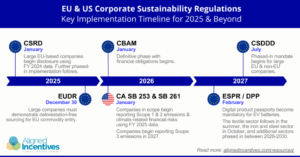At Sunset, we believe corporate responsibility isn’t a checkbox—it’s a commitment. It’s a compass guiding how companies show up for the planet, for people, and for future generations. In 2025, that compass is pointing toward a future that demands more transparency, accountability, and integration than ever before. From climate resilience to supply chain scrutiny, the world is watching—and rewarding—those who lead with purpose.
Here’s a look at the major themes shaping the world of Corporate Responsibility (CR) and ESG (Environmental, Social, Governance) this July:
1. A New Era of Regulation and Stakeholder Accountability
Corporate responsibility today isn’t just about doing the right thing—it’s about doing it in full view, with documentation to back it up. Regulatory frameworks are tightening across the globe, and businesses are learning to adapt in real time.
Europe remains the regulatory pacesetter, with landmark rules like the Corporate Sustainability Reporting Directive (CSRD) and the Corporate Sustainability Due Diligence Directive (CSDDD) reshaping the disclosure landscape. The CSRD now mandates ESG transparency across financial and non-financial dimensions—but recent updates have slightly scaled back the timeline and company coverage, offering some breathing room while maintaining the momentum.
In contrast, the U.S. federal approach remains fragmented. Although national climate disclosure rules have been stalled, states like California are pushing forward with legally binding climate laws, setting a new bar for corporate environmental disclosures. Companies that operate in these jurisdictions—or want to meet investor expectations—have no choice but to get serious about their ESG metrics.
Why it matters:
At its core, regulation is just the tip of the iceberg. The real driver is stakeholder demand—from consumers who care where their products come from, to employees who want to work for values-aligned brands, to investors who view sustainability as a long-term hedge against risk.
2. Corporate Responsibility as Business Strategy
Gone are the days when CR was siloed in a corner department with a few good intentions and a nice annual report. In 2025, the most effective companies are those who weave ESG values directly into the fabric of their operations.
The “hub-and-spoke” model is becoming standard: a centralized CR team oversees strategy, compliance, and reporting, while individual departments—from R&D to procurement—are empowered to execute ESG goals tailored to their specific functions. It’s not just about integrating CR into operations—it’s about making CR the operation.
Companies are also aligning their capital planning, product innovation, and hiring practices with sustainability priorities. Whether it’s sourcing ethically, designing low-impact packaging, or building carbon neutrality into their growth model, CR is now embedded in the business blueprint.
3. Measuring What Matters: Impact, ROI, and Accountability
Transparency without metrics is just storytelling. In 2025, the pressure is on to not only report your sustainability efforts—but to prove they’re working.
We’re seeing a surge in companies investing in data-driven impact measurement, with a focus on:
- Materiality assessments across the value chain
- Scope 3 emissions tracking
- ESG ROI benchmarks
- AI-assisted analytics and blockchain-backed audit trails
AI is leading the charge in automating and enhancing CR reports, enabling organizations to collect cleaner data, faster. Meanwhile, blockchain is being used to verify sourcing claims and build trust with both regulators and customers.
This kind of robust reporting doesn’t just satisfy compliance—it builds brand credibility and opens doors to ESG investment capital.
4. Focusing In: Top Sustainability Priorities in 2025
While every company’s responsibility roadmap is unique, several core issues have emerged as universal priorities this year:
Climate Resilience
Climate strategy isn’t optional anymore—it’s existential. Companies are aligning their risk management and investment strategies with climate forecasts, deepening decarbonization commitments, and taking a proactive role in climate oversight.
Water Stewardship
With water scarcity affecting regions across the globe, companies—especially in manufacturing, agriculture, and tech—are rethinking how they manage this precious resource. From water recycling systems to local watershed partnerships, stewardship is now an essential pillar.
Biodiversity Protection
The biodiversity crisis has taken center stage in 2025, with new regulations and investor expectations prompting companies to assess how their operations impact natural ecosystems. Forward-thinking brands are embracing nature-positive approaches, such as regenerative agriculture and conservation-focused land use.
Supply Chain Transparency
From palm oil to cobalt, companies are under intense scrutiny regarding how they source materials. Thanks to legislation like Germany’s Supply Chain Act and the EU’s CSDDD, human rights and environmental due diligence is no longer just a best practice—it’s a legal requirement.
Employee Well-being and DEI
Internal culture is a core piece of the responsibility puzzle. Organizations are investing in mental health support, inclusive hiring, equitable pay structures, and flexible workplace models. The understanding is clear: people power the mission, and thriving teams create sustainable impact.
5. Leading by Example: Companies Pushing the Envelope
Several companies are showing what modern corporate responsibility looks like in practice:
- Taylor Morrison, a top U.S. homebuilder, recently released its seventh annual Sustainability and Belonging Report, detailing efforts to reduce GHG emissions, elevate construction standards, protect biodiversity through its partnership with the National Wildlife Federation, and build a workplace culture of inclusion.
- Nestlé and Ofi are partnering to combat deforestation in cocoa supply chains. Their new regenerative agriculture initiative aims to plant 3 million trees and use AI-based carbon tracking to quantify their impact—marrying nature-based solutions with cutting-edge tech.
The Road Ahead: Purpose, Pressure, and Progress
Corporate responsibility is no longer a nice-to-have; it’s a defining feature of modern business success. Companies that embrace it as a strategic imperative—rather than a regulatory hurdle—are setting themselves up for long-term relevance and resilience.
At Sunset, we’ll continue to champion innovation, accountability, and purpose-driven growth. We believe business should be a force for good, and we’re proud to stand with others leading the way.
Because responsibility doesn’t end with compliance—it begins with care.



